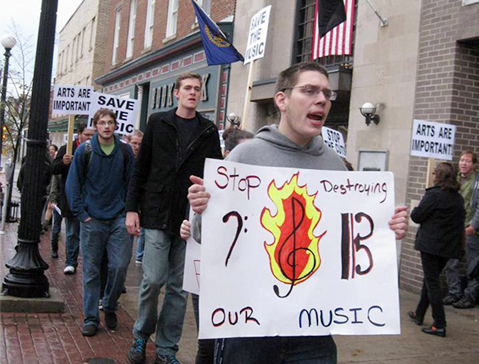Members of Clarion University began protesting the university’s plan to let go of 36 staff members and eliminate the music education and certain foreign language programs this week, just as SRU finished plans for a win-win solution to their budget concerns.
Provost and Vice President for Academic Affairs Dr. Philip Way explained that there are three options to deal with SRU’s projected deficit of $28,901,329 by the 2015-2016 school year. The first is to cut faculty in order to meet the budget’s targets, but he believes that it would damage the institution as well as peoples’ careers.
The second way would be to try to pay the deficit by drawing from unrestricted net assets. The problem with that plan is that the administration is not allowed to draw from reserves at such a great extent, Way said.
Way has been meeting with the SRU chapter of the Association of Pa. State College and University Faculties (APSCUF) on a weekly basis since August to talk about potential solutions to solving the university’s “Perfect Financial Storm.” On Oct 23, a plan for a “third way” was finalized.
“The third way would be let’s work together to protect faculty positions, transferring some faculty, and working together to try and increase recruitment, retention, grant money, etcetera in order to insure that there’s a bigger economic pie in order to cover our cost,’” Way explained. “It’s a win-win situation rather than one side winning and the other side losing.”
The idea behind the third way is that the administration and faculty will participate in extra initiatives to bring money to the university, and in exchange, there will be no retrenchment for certain faculty members.
“APSCUF has not succeeded getting administration to retract the retrenchment letter,” SRU APSCUF President Dr. Patrick Burkhart said. “All that letter does is reserve that option for them to use retrenchment. But SRU APSCUF and SRU administration have accepted the third way [understanding]. The [understanding] states that no tenured or tenure-track faculty will be terminated for financial reasons.”
Way explained that there was a reason why the letter was not pulled.
“In the joint understanding it says that there will be no retrenchment of faculty who are tenured or tenure track. So it effectively negates [the retrenchment letter],” Way said.
An alternative to retrenchment that the administration plans to utilize is transferring up to seven faculty members from declining programs to programs that use similar skillsets, explained Way. If the faculty members need to be retrained, they will be offered schooling for a new Master’s degree for free. Way stated that if a job opens in their old department within five years, they will have the option to transfer back.
Burkhart stated that undergoing a transfer may be hard for some faculty.
“Those departments are feeling the winds of change,” Burkhart said. ”And it may be a sharp or cold wind for them.”
Dr. Rachelle Bouchat, who became a tenured faculty member in the math department three months ago, was asked to be transferred to the Computer Science department. At first, she thought that she would be teaching math courses to Computer Science majors. When she looked at the syllabus, she found out that she was being asked to teach classes about computers, which was a topic that she admitted knowing little about.
Although Bouchat was offered retraining, she declined the transfer and received a retrenchment letter soon after.
One of the main reasons she refused to transfer was that she believes that students should be trained by experts of their field. Bouchat said that she is an expert at math, not computer science.
Aside from transferring faculty, the administration is planning a number of new initiatives to make money for the university.
One initiative is to ensure that all online courses are peer reviewed in order to market the courses to people outside of the university, Way explained.
Another idea is to look at ways that departments can bring high school students to campus in order to get them enthused about enrolling at SRU. Although science fairs are already held on campus, Way hopes that more departments will find similar ways to bring students to campus.
Although SRU has one of the best retention rates in the Pa. state system, Way is also looking at new ways to increase the retention rate. A new program called the “Early Alert System” allows to faculty to go onto D2L to indicate if a student is performing poorly or isn’t attending class. Retention professionals will try to then follow up on the professors concerns and could offer tutoring, or consoling.
“It’s not just going to be the administration telling faculty what to do,” Way explained. “It’s more of a case of we all believe in this, we’re all going to work together to make sure that we do retain our students better.”
Way said that although the university has always been looking for ways to increase revenue, he explained that this new plan is different because there is now a much greater emphasis of cooperation between the faculty and the administration than before.
“At Slippery Rock, we have a culture of working together,” Way said. “We have a history of good relations between the APSCUF union and the administration. We believe this approach is consistent with the culture here and will lead to long term benefits.”
Apart from the new initiatives, SRU will also try to gain lost revenue through natural retirement of faculty, leaving unfilled vacancies, and cutting non-personnel expenditures throughout the colleges in various ways, Way said.
“I’m enthused to hear explicit commitment not to terminate tenure and tenure-track faculty and I agree that we share a vision for a prosperous future for Slippery Rock University,” Burkhart said. “I, like them want this place to be strong and reputable, and I am thankful that we have not received a workforce plan like several of our sister schools who have been substantially traumatized by their retrenchment proposals.”








